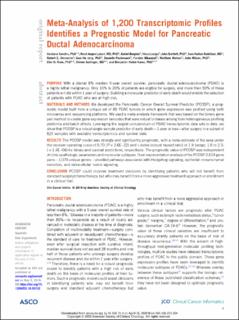| dc.identifier.citation | Sandhu, V., Labori, K. J., Borgida, A., Lungu, I., Bartlett, J., Hafezi-Bakhtiari, S., Denroche, R. E., Jang, G. H., Pasternack, D., Mbaabali, F., Watson, M., Wilson, J., Kure, E. H., Gallinger, S., & Haibe-Kains, B. (2019). Meta-Analysis of 1,200 Transcriptomic Profiles Identifies a Prognostic Model for Pancreatic Ductal Adenocarcinoma. JCO Clinical Cancer Informatics, 3, 1-16. | en_US |
| dc.description.abstract | PURPOSE: With a dismal 8% median 5-year overall survival, pancreatic ductal adenocarcinoma (PDAC) is a highly lethal malignancy. Only 10% to 20% of patients are eligible for surgery, and more than 50% of these patients will die within 1 year of surgery. Building a molecular predictor of early death would enable the selection of patients with PDAC who are at high risk.
MATERIALS AND METHODS: We developed the Pancreatic Cancer Overall Survival Predictor (PCOSP), a prognostic model built from a unique set of 89 PDAC tumors in which gene expression was profiled using both microarray and sequencing platforms. We used a meta-analysis framework that was based on the binary gene pair method to create gene expression barcodes that were robust to biases arising from heterogeneous profiling platforms and batch effects. Leveraging the largest compendium of PDAC transcriptomic data sets to date, we show that PCOSP is a robust single-sample predictor of early death—1 year or less—after surgery in a subset of 823 samples with available transcriptomics and survival data.
RESULTS: The PCOSP model was strongly and significantly prognostic, with a meta-estimate of the area under the receiver operating curve of 0.70 (P = 2.6E−22) and d-index (robust hazard ratio) of 1.9 (range, 1.6 to 2.3; ( = 1.4E−04) for binary and survival predictions, respectively. The prognostic value of PCOSP was independent of clinicopathologic parameters and molecular subtypes. Over-representation analysis of the PCOSP 2,619 gene pairs—1,070 unique genes—unveiled pathways associated with Hedgehog signaling, epithelial–mesenchymal transition, and extracellular matrix signaling.
CONCLUSION: PCOSP could improve treatment decisions by identifying patients who will not benefit from standard surgery/chemotherapy but who may benefit from a more aggressive treatment approach or enrollment in a clinical trial. | en_US |
